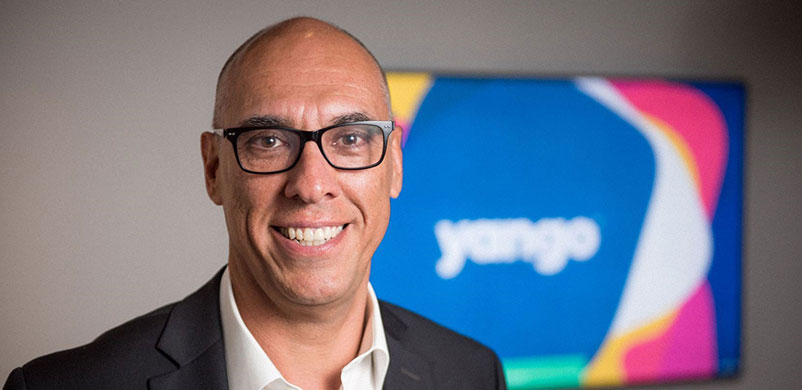"Chaos, complex, anxious and overwhelming": John Sintras in New York for AdWeek

Whole-brain creativity, personalisation at massive scale, relentless disruption, controlling the consumer and the importance of failure. These are a few of the themes and standout topics from Advertising Week New York.
Advertising Week NYC was itself a reflection of the state of the marketing and advertising industry today – chaotic, complex, anxious, and an overwhelming amount of content impossible for any one individual to consume and comprehend. And yes, there's the now well-covered and hotly debated Pitbull controversy.
Ninety eight thousand attendees had the opportunity to create a highly customised experience across four days, 11 stages, 290 events, 1,216 speakers and dozens of themes and talk tracks. If only you could figure out what was important to see and where to see it.
The overarching theme, not surprisingly, was the relentless disruption and transformation of the industry. We seem obsessed with figuring out the right ‘agency/client/consumer’ operating model for the future and everyone wants to be right. It was fascinating to contrast thoughts from legacy holding companies, consultancies, tech players and a diverse array of independent shops across the various stages.
Sadoun verus Sorrell verus Vaynerchuck
Publicis Groupe’s Arthur Sadoun talked very honestly about the huge task and responsibility of transforming and integrating an 80,000-person organisation around consumers and clients.
He’s convinced his recent multi-billion dollar data acquisition will ensure they win, helping reclaim budgets from Google and Facebook and taking back control of consumers – but can we really ever have control of consumers? Feels like the wrong objective.
Sir Martin’s S4 Capital is razor-focussed on digital-only dynamic personalisation at scale and was scathing of the red-ocean legacy holding company model he helped create.
The outspoken and independent Gary Vaynerchuck is convinced the future is all about huge volumes of highly personalised, contextualised and iterative creative messages that the industry must figure out how to make and distribute efficiently at great quality.
Everyone understands that accurate first party data is a must to survive. But who should own it? Dark clouds loom with tighter regulation and privacy concerns. It’s clear no one knows for certain what will really happen in a cookie-less opt-in world, but many people here are thinking and preparing for that.
Most acknowledged we can’t win the future with data alone. Many see a return to creativity, big ideas and making people care as the new differentiation. Most are talking about understanding and embracing culture and passions.
It seems crazy we’re still searching for the one-size-fits-all operating model of the future. Those days are gone. In an increasingly fragmented and iterating world, there will always be myriad client problems and customer opportunities that require myriad possible solutions and operating models.
But, there’s a diverse range of opinion as to what constitutes creativity and creative thinking. Is it one big brand idea, or many brand expressions customised and contextualised? Is it the content itself or how the solutions are created? Is creativity the domain of the creative department or the organisation more broadly?
Even the AI peddlers were talking about the potential for machine learning to be human and empathetic, unleashing a new era of whole-brained creativity. Is it man or machine? Surely it must be a blend of both.
Of course there was much talk about talent and the skills needed to succeed in the future.
Diversity, purpose and Serena Williams
The smart people acknowledged the value of real diversity, constantly seeking out fresh and different perspectives to create empathy and find new insight and solutions. Most talked about the importance of failure and continual iteration, perfection being the enemy of growth and progress. And many talked about the need for resilience, and the importance of mentorship and surrounding yourself with a network of diverse supporters.
Interestingly, some of the most inspiring moments came from outside the industry – celebrities, sportspeople, humanitarians and academics – people who have become brands themselves.
Serena Williams was a particular surprise. Absent was the aggression sometimes seen on the court. In its place was an ambitious but compassionate entrepreneur, eager to make a difference in her world. Constantly challenging herself and iterating. She’s keen to help more women become entrepreneurs and has invested in more than 30 business selected around her passion points and life motto of “less exclusive and more inclusive”. Brands can learn a lot from her. Impressive stuff.
In a week that coincided with world leaders meeting at the UN across town, there was also much talk about brand and company purpose, and the opportunity for brands to step in and help solve local and global problems where governments were increasingly failing to do so.
Unilever claimed last week it is now carbon neutral on five continents, no mean feat. It may seem obvious, but understanding why you exist, helping to communicate that internally and externally, and doing some good in your community and the world is becoming important hygiene for successful companies.
One-size-fits-all model is long gone
At the end of a head-spinning week, it’s clear that the siloed industries of yesterday – entertainment, advertising, marketing, technology, sport, science, consulting, media, culture and academia – are constantly blending and overlapping in new and fascinating ways.
It seems crazy we’re still searching for the one-size-fits-all operating model of the future. Those days are gone. In an increasingly fragmented and iterating world, there will always be myriad client problems and customer opportunities that require myriad possible solutions and operating models.
It’s time we stopped trying to find neat, homogenised solutions and leaned into the amazing times we live in. Yes, people are constantly challenged and need help, but that means there is opportunity everywhere. It’s time to get more positive and create new possibilities in this amazing industry, whatever it’s now called.
